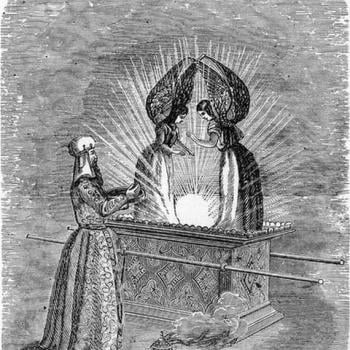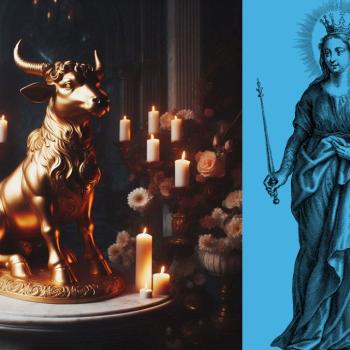It means that the Church has lost its distinctive voice of authority in the contemporary moment. That quotation was written in the 1930s, but it's even more true today. The Church, which had been the primary teaching voice in human history, has lost its voice of authority. It's just another competing voice out there now -- and to tell you the truth, because the Church has shunned using the modern media, it's not even a very compelling voice.
So if you're not going into a Church, you're not hearing the Church's voice. But the Church used to be an authority that would stand up in the culture and say to you, "This is what virtue is. This is what meaning is. This is what the point of your life is. This is good and this is bad."
Where do people find those things now? They listen to television and the movies. They go to the media, and the media will tell them what the point of their life is. I don't know that that's a good thing. It's not a bad thing in every case. There are some people writing who seek very responsibly and seriously to help people discern what matters in life. I know a lot of them in Hollywood. But for many other people, their whole preoccupation in making movies and television is to keep people distracted for 22 minutes, 47 minutes, or 2 hours. For those people, there's no interest at all in doing good, or no concern with doing harm.
Dostoevsky said that man, in the end, will be saved by beauty -- or nothing. In other words, the last voice of authority will be the Beautiful. The Beautiful is the last voice that will be compelling for people. So the question is, if we have become a society that no longer produces the Beautiful, and we're no longer in an agrarian society so people no longer have regular access to natural beauty, then there will in fact be no compelling voice of authority. When there is no ultimate voice of authority in the world, then everyone is his own authority. Then you have moral and cultural anarchy.
How ought the Church to respond?
The Church needs to get back into the work of the Beautiful. It needs to get back into the work of subsidizing and training and mentoring artists and guilds. It needs to feed people who can sing and write music, and commission their works. In a previous day, we would have commissioned statues and paintings. Today's Church should commission novels and movies and screenplays.
The fact that there is not a single Christian university in the top twenty film programs in the world is a sign that the Church has lost its way in modernity. We are not seeing ourselves as people of this moment.
The saddest realities to look at are not Hustler magazine and Big Love. Much more tragic is what you find on EWTN and CBN, because these things are devoid of creativity and devoid of respect for the audience. They are banal. They may be produced with the best of intentions, but they have no sense of the appropriateness of the art form, of using the medium to its full potential.
Sad though it is, you would never call the Church the patron of the arts today. Never. You would be laughed down. I know that to be true. I used the phrase with a class of undergrads. A young woman raised her hand and said, "Who is the ‘patron of the arts'?" I asked the students who they thought the patron of the arts is. They looked at me for a while, and finally one kid raised his hand and said, "The Bravo Channel?"
"Patron of the arts" used to be the moniker of the Christian Church. But this generation has no experience of the Church being a patron of the arts. We are so far behind in being a compelling voice in the culture. We have allowed our voice in culture to disappear.
John Paul II said that this generation of Christians will have to atone for its failure to use the media to spread the gospel of life. This generation of Christians will be called to account for its failure to use these powerful gifts we have in our hands to create global community and to move people to tears. Others will be asked why they did not recognize Jesus. We will be asked why we did not make television shows.
Many perceive a tension between "heartland" and "Hollywood" values. Is that a legitimate perception?
Again, not to get myself burned in effigy, but Christians feel as alienated from Hollywood as Hollywood people feel watching EWTN or CBN. Hollywood has a value of excellent production value, of talent, and the pagan world absolutely believes in talent, this mysterious gift that comes from they-know-not-where. We know where it comes from; they don't know where it comes from, but they believe in it.




